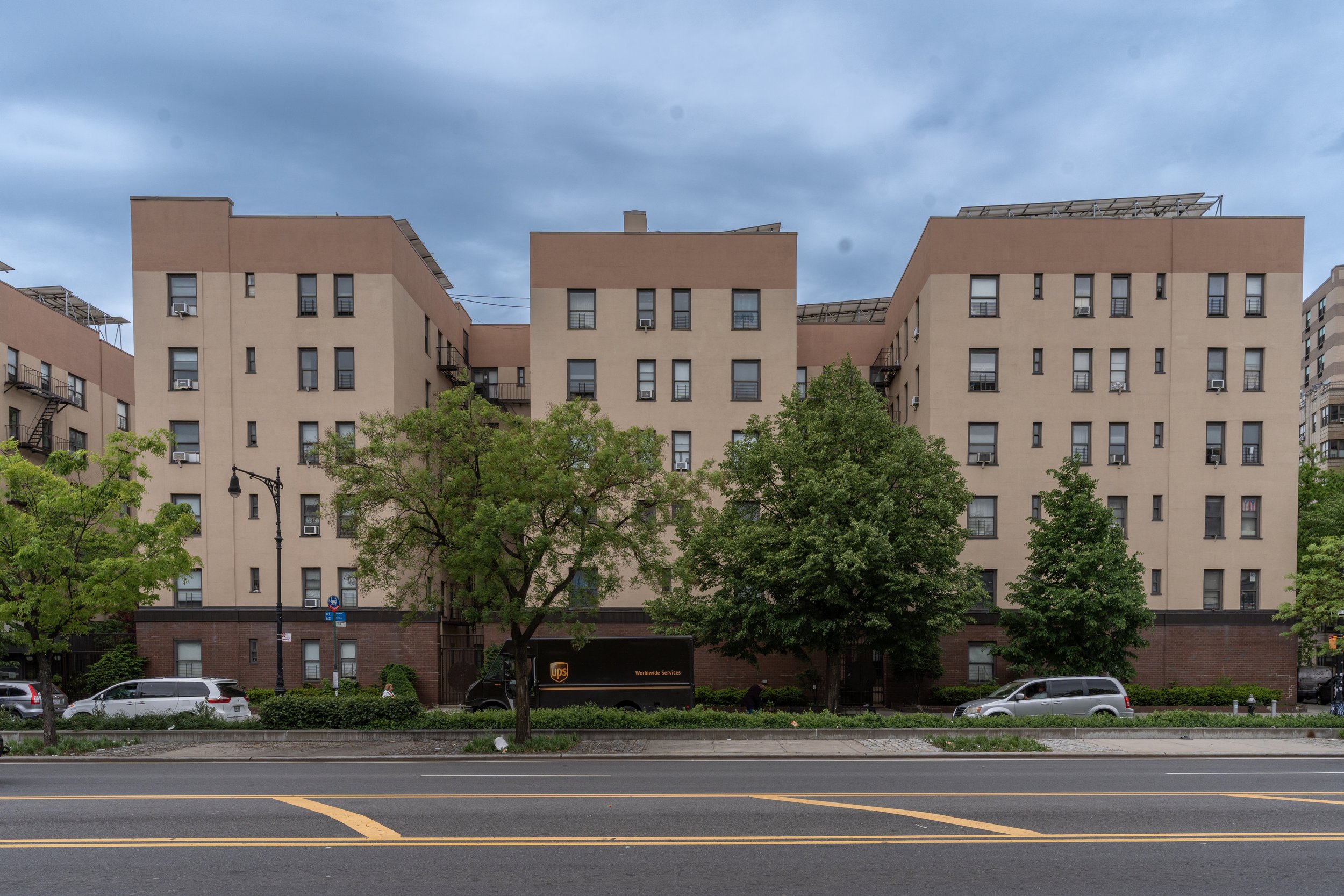
Roosevelt
Gardens
Roosevelt Gardens is a deep retrofit project including roof insulation and replacement, conversion to full electrification for heating and cooling, solar canopy, boiler replacement, building envelope improvements, window replacement, 14 elevator modernization, interior and exterior lighting efficiency upgrades.
Major improvements to building envelope (new insulation to walls and roof, window replacement), new electric heat pump/VRF for heating and cooling, efficient hot water heaters) lighting replacement, water efficient fixtures, energy efficient elevator modernization, and building energy management system.
Location
1463 Grand Concourse
Bronx, New York 10452
Surface Area
290,000 SF
Category
Affordable Housing, Occupied Rehab
Role / Self Performance
Construction Manager
Roosevelt Gardens, a notable example of Pre-War affordable housing, was originally constructed in 1923 as 14 separate but contiguous low- to moderate-income multifamily residential buildings.
The capital improvements undertaken at this property transformed an aging structure through energy efficiency and renewable energy measures, highlighting the benefits of improved operating performance, reduced costs, lower carbon emissions, and enhanced occupant health and well-being.
Capital Improvement Highlights
Key Upgrades Implemented
Roof assembly with R-35 insulation and reflective cool roof membrane.
A 410 kW solar electric array.
High-efficiency gas condensing boiler space heating and integrated domestic hot water system.
Modernized elevators with VFD motors and controls.
New LED lighting in common areas.
In-unit low-flow aerators for faucets and showerheads, as well as LED lamps.
Importance of Upgrades
Energy efficiency and renewable energy upgrades are critical for affordable housing, especially in disadvantaged communities. Improved health outcomes result from reduced exposure to ambient air, water, soil, and noise pollutants. Additionally, lower utility costs free up disposable income for essentials like food, clothing, healthcare, and education. Community benefits include enhanced family health, economic stability, equitable income, and cultural diversity.
Challenges Addressed by Energy Efficiency/Renewable Energy Upgrades
Roosevelt Gardens’ last major heating system retrofit occurred 30 years ago, leading to rising energy consumption rates, higher operating costs, and the need to reduce carbon emissions to comply with local climate legislation, such as Local Law 97. The project aimed to address these issues by replacing the outdated heating system, eliminating underground steam heat pipes to combat pest infestations, and optimizing the overall heating system performance through additional measures. These included installing a new insulated watertight roof assembly, air sealing entry/exit vestibules, and adding a large rooftop solar array. The new high-efficiency gas condensing hydronic system allows for an easy transition to an all-electric future.
Beautification and Quality of Life-Focused Upgrades
Elevator Modernization
Modernized 14 elevators in six-story buildings, improving accessibility for vulnerable populations & convenience for families by ensuring reliable & efficient access.
Security Enhancements
Installation of new cameras and an advanced security system to ensure tenant safety and confidence, deterring criminal activity and providing peace of mind.
Facade Improvements
Full waterproofing and painting of the facade enhanced the aesthetic appeal of the buildings, providing a fresh and inviting look to the community.
Waste Management Improvements
Introduction of compactors improved the quality of life for maintenance staff by streamlining waste management processes, making disposal more efficient and less labor-intensive, and enhancing overall maintenance operations and cleanliness in the complex.
Principal Benefits
To the Bottom Line
Annual savings of approximately 808,000 kWh in electricity and 2,350 MMBtu in gas, resulting in estimated utility cost savings of $185,000.
Reduced operation and maintenance costs, including elimination of steam heat system and roof maintenance costs, reduced pest control costs, fewer tenant complaints, and avoided Local Law 87/97 penalties totaling approximately $1.76 million from 2024 to 2050.
Increased property value and improved future capital financing costs.
To Tenants
Improved control over indoor thermal comfort.
Reduced exposure to harmful air pollutants and greenhouse gas emissions.
Enhanced air quality and overall conditions for health and well-being.
Lower heating and electricity bills, increasing disposable income.
Other Benefits
Lower building emissions and improved ambient air quality in the community.
Improved quality of life and lower living costs allow low-to-moderate-income (LMI) families to remain in the neighborhood, contributing to its cultural, social, and economic vibrancy.
Increased demand for local businesses and trades.








